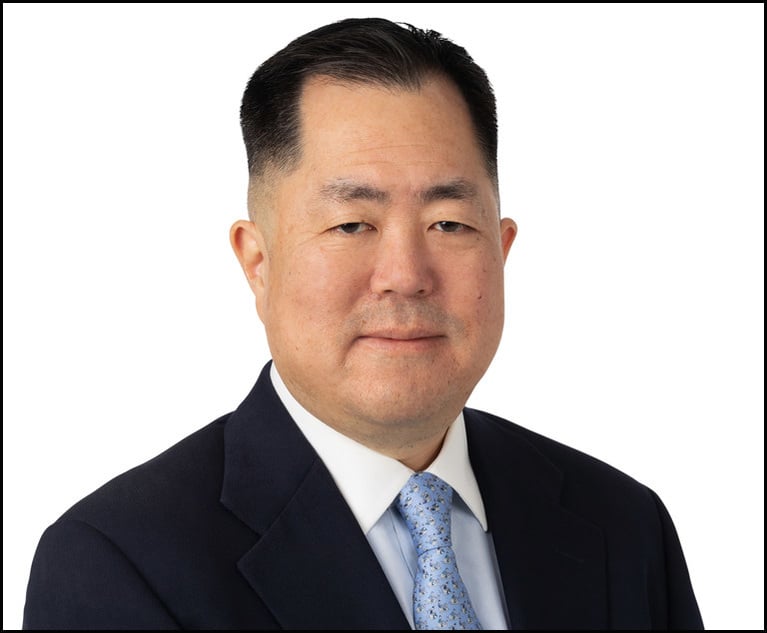 Credit: Akshdeep Kaur Raked/Shutterstock.com
Credit: Akshdeep Kaur Raked/Shutterstock.comKoh Says It's Too Soon to Block Potential iPhone Import Ban
Qualcomm may be making process in its ITC case against Apple, but it's a long way from actually winning, says a judge presiding over antitrust actions.
August 30, 2018 at 06:48 PM
3 minute read
Consumers waging an antitrust class action against Qualcomm Technologies Inc. in San Jose have lost their bid to block any U.S. International Trade Commission orders that might exclude imports of Apple iPhones.
Qualcomm has asked the ITC to exclude iPhones that use Intel modem chips, saying they infringe three Qualcomm patents. The ITC hasn't ruled yet, but Administrative Law Judge Thomas Pender said at a June hearing that it's “very likely that there will be a violation found” when he issues an initial determination next month.
Consumers represented by co-lead counsel Susman Godfrey and Cotchett, Pitre & McCarthy asked U.S. District Judge Lucy Koh of the Northern District of California to enjoin Qualcomm from enforcing any ITC exclusion or cease-and-desist order. Koh is presiding over separate actions brought by consumers and the Federal Trade Commission alleging that Qualcomm's patent licensing and enforcement practices are anticompetitive.
Koh denied the injunction without prejudice Wednesday, saying the injury feared by the plaintiffs is far too speculative at this point.
“As plaintiffs appear to recognize, their purported harm depends upon a number of contingencies,” she wrote in a 22-page order. Those include a finding by Pender that an exclusion is in the public interest, affirmance by the full ITC, and sign off from the White House and the U.S. Court of Appeals for the Federal Circuit.
“This chain of inferences is too speculative to conclude that plaintiffs face an imminent risk of injury,” Koh wrote. “Given the various policy concerns at issue, courts are particularly ill-equipped to forecast how either the ITC or the president will strike the appropriate balance.”
The plaintiffs cited a report that estimated an exclusion order would ban 29.3 million Apple smartphones, causing an average $47 price increase.
While ITC staff has recommended that one patent be found infringed, staff also cautioned that future iPhones with 5G technology should be exempt from any ban, Koh noted. And Pender said at the hearing that he could not predict whether “the public interest will be sufficient to outweigh” a patent violation.
Koh's ruling hands a win to Qualcomm and its attorneys from Keker, Van Nest & Peters; Cravath, Swaine & Moore; and Morgan Lewis & Bockius. Keker Van Nest partner Robert Van Nest signed Qualcomm's opposition to the injunction.
The parties are scheduled to argue class certification before Koh next month, with trial scheduled next summer. The FTC case is scheduled to go to trial in January. Apple Inc. and its contract manufacturers are also bringing patent and antitrust claims against Qualcomm in San Diego federal court. That case is approaching a trial near the end of this year.
This content has been archived. It is available through our partners, LexisNexis® and Bloomberg Law.
To view this content, please continue to their sites.
Not a Lexis Subscriber?
Subscribe Now
Not a Bloomberg Law Subscriber?
Subscribe Now
NOT FOR REPRINT
© 2025 ALM Global, LLC, All Rights Reserved. Request academic re-use from www.copyright.com. All other uses, submit a request to [email protected]. For more information visit Asset & Logo Licensing.
You Might Like
View All
Apple Disputes 'Efforts to Manufacture' Imaging Sensor Claims Against iPhone 15 Technology

'Another Broken Promise': California Tribes Sue Casinos for Allegedly Illegal Profit From Card Games

After Solving Problems for Presidents, Ron Klain Now Applying Legal Prowess to Helping Airbnb Overturn NYC Ban
7 minute read
Husch Blackwell Hires Former Adobe Counsel to Oversee AI Advisory Offering
3 minute readTrending Stories
Who Got The Work
Michael G. Bongiorno, Andrew Scott Dulberg and Elizabeth E. Driscoll from Wilmer Cutler Pickering Hale and Dorr have stepped in to represent Symbotic Inc., an A.I.-enabled technology platform that focuses on increasing supply chain efficiency, and other defendants in a pending shareholder derivative lawsuit. The case, filed Oct. 2 in Massachusetts District Court by the Brown Law Firm on behalf of Stephen Austen, accuses certain officers and directors of misleading investors in regard to Symbotic's potential for margin growth by failing to disclose that the company was not equipped to timely deploy its systems or manage expenses through project delays. The case, assigned to U.S. District Judge Nathaniel M. Gorton, is 1:24-cv-12522, Austen v. Cohen et al.
Who Got The Work
Edmund Polubinski and Marie Killmond of Davis Polk & Wardwell have entered appearances for data platform software development company MongoDB and other defendants in a pending shareholder derivative lawsuit. The action, filed Oct. 7 in New York Southern District Court by the Brown Law Firm, accuses the company's directors and/or officers of falsely expressing confidence in the company’s restructuring of its sales incentive plan and downplaying the severity of decreases in its upfront commitments. The case is 1:24-cv-07594, Roy v. Ittycheria et al.
Who Got The Work
Amy O. Bruchs and Kurt F. Ellison of Michael Best & Friedrich have entered appearances for Epic Systems Corp. in a pending employment discrimination lawsuit. The suit was filed Sept. 7 in Wisconsin Western District Court by Levine Eisberner LLC and Siri & Glimstad on behalf of a project manager who claims that he was wrongfully terminated after applying for a religious exemption to the defendant's COVID-19 vaccine mandate. The case, assigned to U.S. Magistrate Judge Anita Marie Boor, is 3:24-cv-00630, Secker, Nathan v. Epic Systems Corporation.
Who Got The Work
David X. Sullivan, Thomas J. Finn and Gregory A. Hall from McCarter & English have entered appearances for Sunrun Installation Services in a pending civil rights lawsuit. The complaint was filed Sept. 4 in Connecticut District Court by attorney Robert M. Berke on behalf of former employee George Edward Steins, who was arrested and charged with employing an unregistered home improvement salesperson. The complaint alleges that had Sunrun informed the Connecticut Department of Consumer Protection that the plaintiff's employment had ended in 2017 and that he no longer held Sunrun's home improvement contractor license, he would not have been hit with charges, which were dismissed in May 2024. The case, assigned to U.S. District Judge Jeffrey A. Meyer, is 3:24-cv-01423, Steins v. Sunrun, Inc. et al.
Who Got The Work
Greenberg Traurig shareholder Joshua L. Raskin has entered an appearance for boohoo.com UK Ltd. in a pending patent infringement lawsuit. The suit, filed Sept. 3 in Texas Eastern District Court by Rozier Hardt McDonough on behalf of Alto Dynamics, asserts five patents related to an online shopping platform. The case, assigned to U.S. District Judge Rodney Gilstrap, is 2:24-cv-00719, Alto Dynamics, LLC v. boohoo.com UK Limited.
Featured Firms
Law Offices of Gary Martin Hays & Associates, P.C.
(470) 294-1674
Law Offices of Mark E. Salomone
(857) 444-6468
Smith & Hassler
(713) 739-1250






